2005 National Youth Championships - Retrospective: Premier Championship
14-Apr-20054BR looks back at the Premier Championship where a mythical sinking by Simon Dobson was perhaps the real highlight of a day where the bands didn't quite match the brilliance of his test piece 'Lyonesse'.

West Lothian Schools band celebrate their win
Although there were only the four bands taking to the stage at the Bruntwood Theatre in the Royal Northern College of Music for the Premier Championships, there was still a great deal of expectation in the air.
Most of that was to do with two things: The expected standard of performances of the bands on show, and the expectant excitement created by the new test piece for the occasion, ‘Lyonesse' by the young Cornish composer, Simon Dobson.
In the event, one fully lived up to the billing, whilst the other didn't quite make it. The surprise though was that it was the set work that literally took the breath away on this occasion, and not the playing of the bands.
The test piece was an absolute corker – a tremendous piece of atmospheric writing from the young man who in 2002 was the winner of the European Young Composer Competition, and who subsequently became the 4BR ‘Newcomer of the Year' winner, and who in 2003, provided Fourth Section Bands with perhaps the best test piece they had played for many a year at the Regional Championships when his ‘Lydian Pictures' was used around the country.
‘Lyonesse' took it's inspiration from the mythical tale of the land that sunk beneath the sea on a stormy night in 1099, and which every now and again, resurfaces through the ghostly chimes of its church bells which can be heard on the distant sea shores of both Scilly and Cornwall.
 We spoke to the composer, Simon Dobson about the piece after he had heard it played, and he was delighted with the way in which the bands had approached the work. "It is a story that has stuck with me ever since I was told about it when I was a kid by my parents," he said. "It is a magical story, but one that is also a bit frightening, and I thought it would make a great musical story as well, what with the scenes of destruction, mining and final redemption all mixed in with the sea. My congratulations go out to all of the players and the conductors – it was a great thrill for me to hear the work played so well."
We spoke to the composer, Simon Dobson about the piece after he had heard it played, and he was delighted with the way in which the bands had approached the work. "It is a story that has stuck with me ever since I was told about it when I was a kid by my parents," he said. "It is a magical story, but one that is also a bit frightening, and I thought it would make a great musical story as well, what with the scenes of destruction, mining and final redemption all mixed in with the sea. My congratulations go out to all of the players and the conductors – it was a great thrill for me to hear the work played so well."
He wasn't wrong either, as all four bands on the day really brought something out of this tremendously original score, which would have tested many bands at a higher level in the senior movement to the full. It is hoped that it will certainly be used again, and we wonder if the Nationals in Harrogate may well see it used once more. It deserves it, as it was a real highlight of a weekend of many highlights for us.
The winners of the Premier Championship were West Lothian Schools, conducted by Nigel Boddice, and on the day they were clear victors.
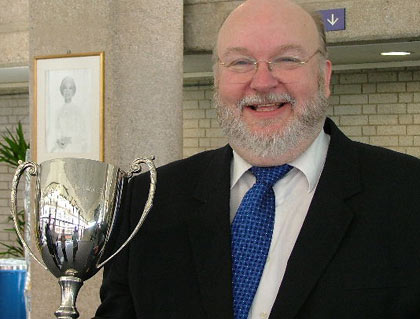
Nigel Boddice: Winning MD of West Lothian Schools
It must be said though that theirs was not a faultless performance of either the set work or their own choice selection of ‘Renaissance' by Peter Graham, although we thought it deserved a Gold Certificate Award rather than the Silver it was given by the two judges Major Peter Parkes and Philip McCann.
Major Parkes gave a most constructive and realistic appraisal of all four bands performances, which touched on the fact that the overall standard of performances was perhaps not as high as he had possibly come to expect, given what he had heard over the years here. He touched on the aspects that at this level do cause the most problems: intonation and dynamics.
"It is a fine piece," he said. "It has its difficulties such as the note D which keeps coming in at the beginning, yet must be played in tune. This was not always the case with all the bands."
On the question of dynamics he also made some telling yet constructive points: "Intonation is the most important thing, but dynamics are just as important as well. Sometimes you have to be more careful about how loud you play. It is a virtue to be able to play both loud and soft – it is not a virtue just to be able to play loud. The sound must always be beautiful, and so you must be careful about how you play at the extremes of the dynamic range."
This was an excellent, erudite and accurate appraisal – which was in complete contrast to what the other judge, Philip McCann had to say.
We have heard Philip McCann on a number of occasions as a judge, and he has always come across as well prepared and thoughtful, detailed and realistic. He can also be dour and can sound like a man who doesn't give undue praise when he feels none is warranted.
This was one such occasion.
In fact this was not a particularly thoughtful set of remarks at all. The piece was damned with faint praise – even its historical authenticity was questioned (Philip stated the story possibly came from Brittany or Lothian even – although his research missed out the obvious story from Plato's ‘Atlantis') and his references to the mechanical atmosphere of the tin mines and the lack of atmosphere created by the bands sounded more like a oblique reference to the score rather than the bands ability to play the music.
It was slightly disappointing to hear him rather dismiss the intricacies of the scoring, and the rather laboured point over the composer's intentions of ‘chaos' was not very transparent. He did go onto compliment the four MDs, stating that they were ‘well directed' and that ‘they all need to be applauded' – but again it sounded as if that applause was due to their efforts in overcoming a rather poor composition. ‘It was very close between two bands'" he said, but given what he had said before hand, you were left wondering why. Philip McCann is a fine musician, but sometimes that isn't enough when explaining yourself, and this was a bit piquant and slightly sour.
Rochdale Borough under the direction of Eric Langon opened the contest. Eric has done sterling work with this band over the years, but on this occasion he perhaps made a poor decision in choosing Gilbert Vinter's ‘Triumphant Rhapsody' as their opening item.
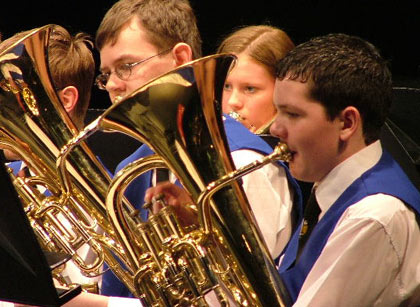
Rochdale Borough: Euphonium section
It may seem unfair to criticise young players trying their best, but this was poor playing and poor direction. The tempos were far too quick and resulted in the players being unable to perform with clarity or style – it was all too rushed and forceful, and whilst there was some excellent soprano and euphonium playing in places the rest was not very good.
Vinter's music is full of wit as well as darkness, and neither was on show here and there seemed a lack of understanding of the music from both MD and performers. An ambitious choice that didn't come off.
Not so the test piece, which was given a very good world premiere with some excellent ensemble and individual playing from the solo cornet opening right through to the fine bit of work from the percussion team on the submerged bells. Everyone seemed to be more at home with this music – the MD gave the score plenty of time and space and his players responded to provide a worthy account. It was a different league from the Vinter, and showed a great deal of character which overall gave them a Bronze Certificate and third place.
There is plenty of more to come from this combination, but perhaps a more realistic approach to the own choice piece could have benefited them more this time.
They were followed onto the stage by St. Helen's Youth under the elegant direction of Lynda Nicholson. This is another combination that has been excellent over the years, but this time they seemed to be a partnership that is perhaps a year or two away from maturity.
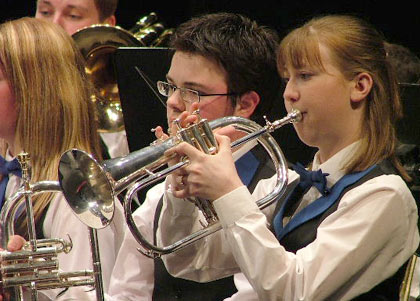
St. Helen's Youth: Flugels
They opened with Edward Gregson's ‘Essay' which over twenty years ago now was used as the Championship Section test piece at the Regional Championships. In those twenty years or more though it hasn't worn well, and now seems dated and rather repetitive – not an essay of William Hazlitt or Michael Foot qualities, more GCSE A Level standard.
The piece also didn't quite give the band the chance to show off its obvious qualities in ensemble sound – as too many of the individual lines had little errors and cracks that just took the gloss off a broad and spacious reading by the MD. By the time the third movement came to a close, it was a performance that promised much but just failed to deliver.
Again though, ‘Lyonesse' was given an excellent account – full of atmospheric features, little nuances and some excellent individual contributions – the best of which came from Aimee Twist on euphonium, who was outstanding in her approach, sound and security of technique and deservedly won the ‘Best Instrumentalist' prize and the £100 Bursary donated by the British Federation of Brass Bands.

St Helen's: Best soloist Aimee Twist
Lynda Nicholson gave the music time and space in which to develop, and once again the ensemble sound was broad and in tune, so by the end and the large chords that end the piece, everything was still in control. It was a very good performance indeed and second place and a Silver Certificate was well deserved.
The winners next, and right from the first notes of the tricky opening carillon section of the set work it was obvious that this was a band that had done its homework and also had an MD who had a complete understanding of the intricacies of the score. Thus, all those effects came across as crystal clear, and that was emphasised even more as the work progressed and the slower atmospheric sections of writing came to life with a real luminescence. It was a cracking account that held the attention right to the end and was the best of all the four performances on the day by some margin.
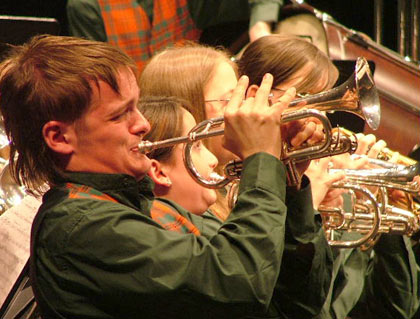
West Lothian Schools: Soprano player
They followed that with ‘Renaissance' by Peter Graham and like the other bands on the day, it was this own choice that caused them more problems than the set work. There was some fine playing throughout, but it was also uneasy in places as the players perhaps tried too hard to extract some excitement from what is a rather dry and at times academic piece. There was some neat individual playing from the solo cornet and baritone in particular, who for us was the best player in the entire section and the soprano was a real star as well as he gave everything in the cause – including a last note when we thought his head may explode!
It rounded off though a performance of merit and overall it was more than a little unlucky it didn't get the Gold Certificate we thought it deserved. Nonetheless it took the top honours and with it the Championship trophy and £350. Lots of Iron Bru and deep fried Mars bars then to celebrate on the way home.
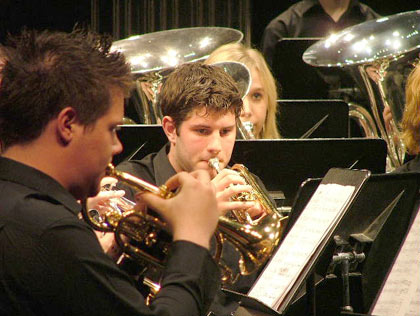
Northampton County Youth Brass
That just left Adele Sellars and her Northampton County Youth Brass, who looked like the most mature band on the day (there were a few young lads sporting more than enough downy facial hair) and who produced perhaps the biggest sound.
The problem for them though was that even though it was a big sound, it was a rather cold sound as well with very few of players individually playing with a nice rounded tone or with a delicate vibrato. Perhaps that is the way in which they are taught, but it meant that during the opening ‘Lyonesse' that lack of warmth to the timbre detracted from some neat playing and a thoughtful interpretation from the elegant MD. It was a well paced performance that had lots of detail, but by the time the last chord was blown out of tune and with a shallow edge, it rather took the gloss off.
Their won choice was interesting though, with the MD opting for three movements from ‘Call of the Cossacks' – amore concert orientated piece than a test piece perhaps, but one that was well played nonetheless. The opening ‘Tartar Dance' was well handled, but the ‘Doyle's Lament' just again lacked that warmth of timbre that would have made it so much better. It was secure playing from the flugel though - but oh for some vibrato! The final section skipped along with a few vodka induced moments in certain quarters, but a surprising tempo change by the MD didn't work and it all ended a bit scrappily. Fourth place in this company was about right.
And that was that. Some good, if not outstanding playing from the bands, some neat individual work from soloists and some variable conducting from the MDs and comments from the judges, but overall it was still pretty good quality. The winners though fully deserved their title, whilst Mr Dobson fully deserved all the plaudits for an excellent test piece.
Iwan Fox















